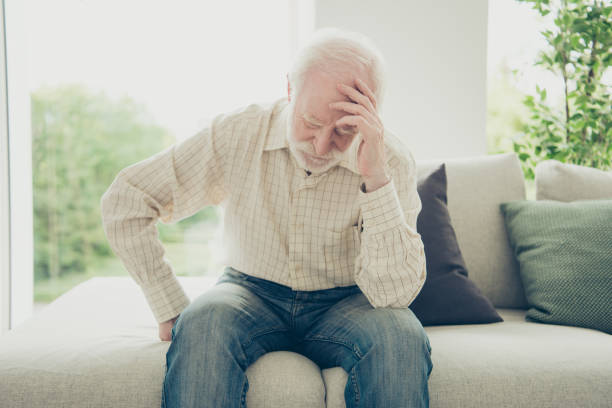If major depression is untreated, the downward spiral can be catastrophic.

Clinical depression was once considered a “woman’s disease,” even though more than 6 million men in the US have depression each year (no definite statistics in SA).
Unfortunately, the lingering image of depression as a female condition may keep men who are clinically depressed from recognising the symptoms of depression and seeking treatment. Depression affects both sexes. It disrupts relationships and interferes with work and daily activities.
The symptoms of depression in men are similar to the symptoms of depression in women. But men tend to express those symptoms differently.
Common symptoms of depression include loss of interest in usually pleasurable activities, fatigue, changes in appetite, sleep disturbances and apathy.
In women, depression may be more likely to cause feelings of sadness and worthlessness. Depression in men, on the other hand, may be more likely to cause them to become withdrawn or to feel irritable, aggressive, or hostile.

Picture: iStock
A 2009 survey shows that depression is undertreated in SA and that major depression occurs earlier in the younger generation. The lifetime prevalence of major depression reaches 10% for people aged 18 to 29 and occurs seven years earlier than those aged 30 to 39.
If major depression – with an estimated prevalence of about one in 20 adults (4.9%, according to the SA Stress and Health Study) — is untreated, the downward spiral can be catastrophic.
There are reports that men are four times more likely to commit suicide compared to women, which could be because of underdiagnosed depression in men. Men are more prone to suicide because they are less likely to openly show depression and have somebody else recognise it early enough to treat it, or to have themselves recognise that they’re in trouble.
Burnout and depression among men are hidden – and rising – afflictions in South Africa. The number of men admitted to private psychiatric clinics for depression last year was nearly a third higher than in 2010 and absenteeism owing to stress among men, particularly executives, jumped between 2008 and 2013.
Men tend to leave it until later and the presentation is of a more serious nature. The majority are depressed and not seeking treatment. When men get red-light signals from their bodies, they are more likely to take a substance, like alcohol and drugs, to make the signals go away.

Whisky. Picture Thinkstock
Men are less willing than women to say they are burned out and more likely to have other diagnoses like addiction or post-traumatic stress disorder.
Depression in men can affect sexual desire and performance. Unfortunately, some antidepressants and other medications can do the same.
Men are often unwilling to admit to problems with their sexuality. Many mistakenly feel that the problems are related to their manhood, when, in fact, they are caused by a medical problem such as clinical depression.
Society and socialisation play a particularly important role in identifying and treating male depression. Depression in men often can be traced to cultural expectations.
Men are supposed to be successful. They should not openly express their emotions. They are taught that boys don’t cry. They must be in control. These cultural expectations can mask some of the true symptoms of depression.
Instead, men may express aggression and anger, which is seen as more acceptable “manly” behaviour. Therefore, they are more likely to deal with their symptoms by abusing alcohol and drugs, or pursuing other risky behaviour.
Elderly men may have medical conditions such as heart disease, stroke, cancer, or other stressors that may contribute to depression.

Picture: iStock
Causes and risk factors
You cannot say for certain what causes depression in anyone; it is different for everyone. Sometimes a difficult time in you or your friend’s life can set off depression; sometimes it is caused by a combination of things that have built up over time.
And sometimes, there is just no obvious cause at all. Family history does, however, play a role.
Some risk factors for men developing depression include:
- physical health problems
- relationship problems
- employment problems
- social isolation
- significant change in living arrangements (eg. separation or divorce)
- drug and alcohol use.

Picture: iStock
Signs and symptoms
Depression signs and symptoms can differ in men and women. Men also tend to use different coping skills, both healthy and unhealthy, than women do.
It is not clear why men and women may experience depression differently. It may involve brain chemistry or hormones but socialisation and life experiences also play a major role.
Symptoms that are similar in both sexes include:
- Feel sad, hopeless or empty
- Feel extremely tired
- Have difficulty sleeping
- Not get pleasure from activities they once enjoyed
Behaviours that are mostly seen in men that could be signs of depression include:
- Escapist behaviour, such as spending a lot of time at work or on sports
- Alcohol or drug abuse
- Controlling, violent or abusive behaviour
- Irritability or inappropriate anger
- Risky behaviour, such as reckless driving
These behaviours are not specific to mental illness, it is, therefore, important to seek professional help.

Picture: iStock
Treatment
Clinical depression cannot be self managed, you need to get help from your doctor. Asking for help can be hard for men. But without treatment, depression is unlikely to go away, and it may get worse.
Untreated depression can make you and the people close to you miserable. It can cause problems in every aspect of your life, including your health, career, relationships and personal safety.
Depression, even if it’s severe, usually improves with medications or psychological counselling (psychotherapy) or both.
Many effective treatments are available. So don’t try “be a man about it” and think you can do this on your own.
For more news your way, download The Citizen’s app for iOS and Android.






